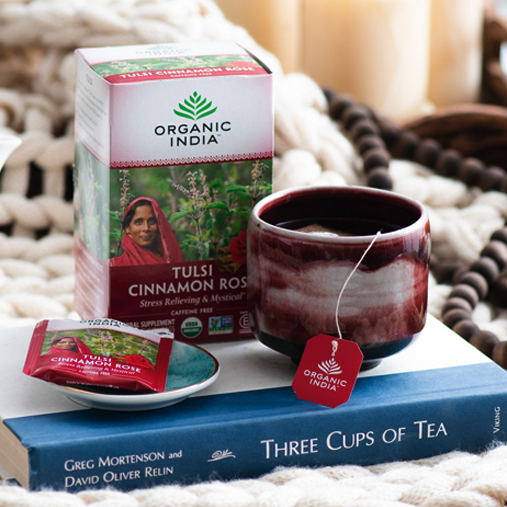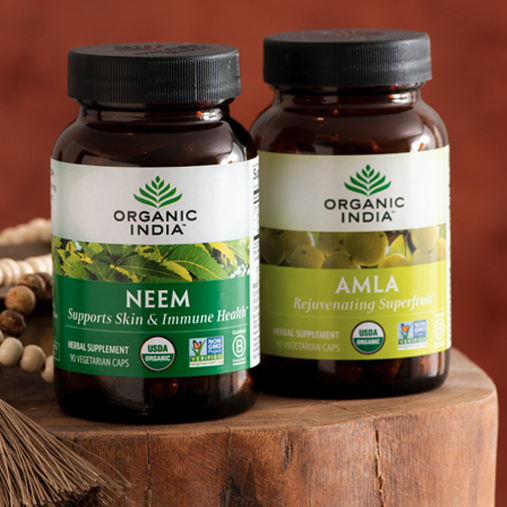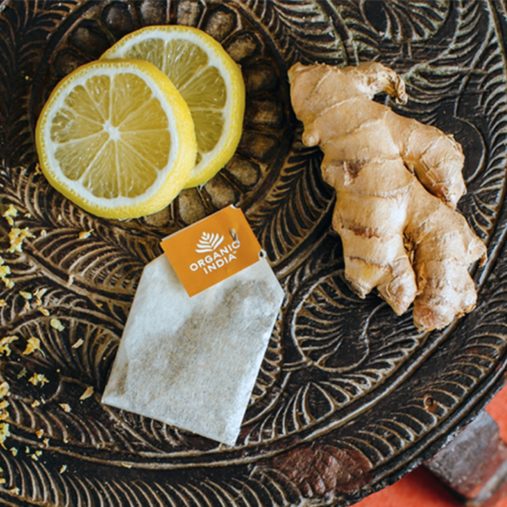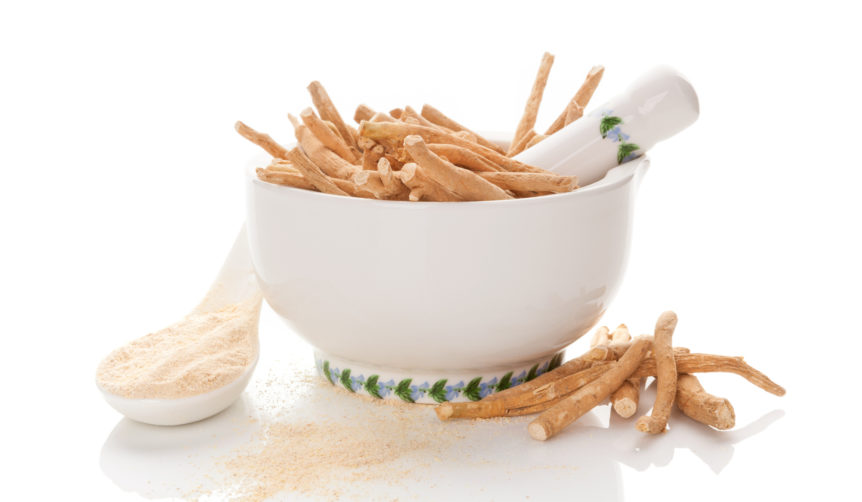Back
Across the deserts, plains, and mountains of northern India, an herb has been gathered for more than 6,000 years to be used in cooking, religious rituals, and in Ayurvedic medicine. Most commonly referred to as Ashwagandha, or sometimes “winter cherry,” it is still a mainstay today, prized by those who adhere to the principles of traditional Indian medicine linking mind, body, and spirit.
Ancient Herb, Modern Concerns
The name “ashwagandha” comes from the Sanskrit word “ashvagandha,” which roughly translates to “smells like a horse.” Some take this name literally, as its odor can be reminiscent of horse perspiration.
The first-known mention of ashwagandha appears in the Rig Veda, one of the world’s oldest religious texts. Ayurvedic principles are scattered throughout the Vedas, reminding us that India is home to one of the world’s most ancient healing systems.
For thousands of years, ashwagandha has maintained its status as Ayurvedic medicine’s foremost Rasayana, a rejuvenating tonic that is said to support longevity and physical health. For this reason, its history is deeply entwined with that of Ayurvedic science.
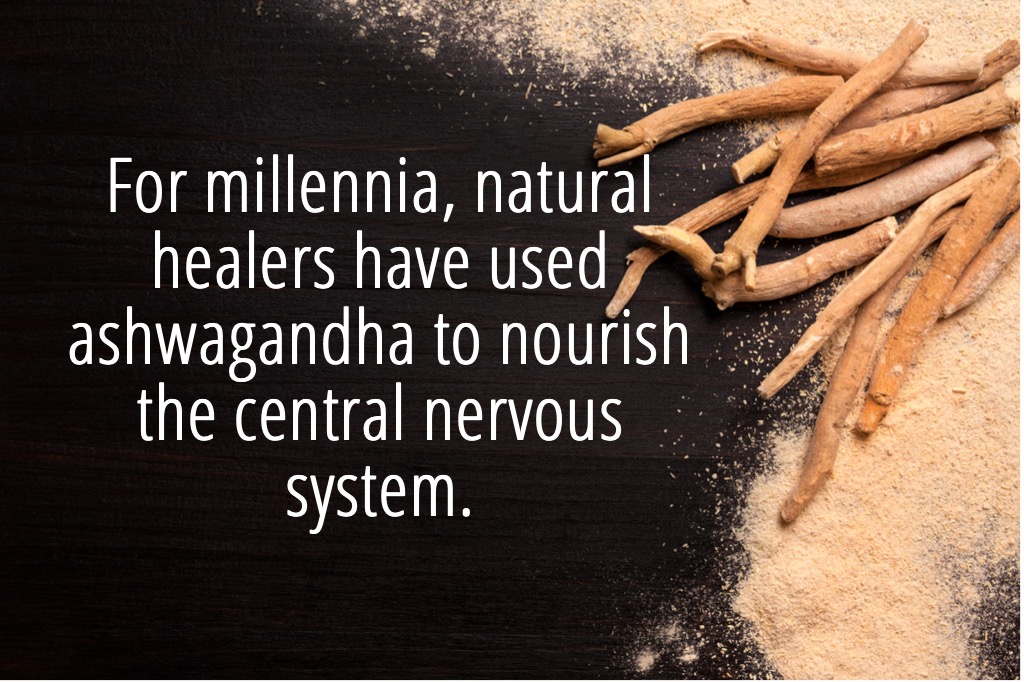
Nootropics for Cognitive Function
One may wonder at the foresight of Ayurveda in its practicality and application. Practitioners assert that the plant kingdom has provided for the complicated demands that we meet in modern times — anxiety, cognitive overload, and a host of mental, emotional, and physical issues. Every year seemingly becomes more busy, with higher demands for productivity matched by mounting levels of stress. To keep up, many have turned to nootropics — substances used to enhance cognitive function, memory, creativity, and motivation. For millennia, natural healers have used ashwagandha to nourish the central nervous system so that it can perform at its highest capacity, and clear toxins that impede healthy cognitive function.
While many turn to synthetic pharmaceuticals to fill the role of nootropics, the ancient herbal approach may prove the wiser choice owing to its lack of known side effects, its abundance of health-enhancing properties, and how it resonates with the human organism.
Adaptogens for Chronic Stress
Now inescapable in our modern era, stress and anxiety have become ubiquitous, affecting mind, body, and spirit. Although the body produces chemicals and hormones to address stress, the deeper issue is when stress becomes chronic and elevated cortisol levels cause systemic health issues. Fortunately nature provides an answer in adaptogenic herbs, such as ashwagandha, to help the body resist physical, chemical, and biological stressors.
As one of the most powerful herbs in the Ayurvedic arsenal, ashwagandha has also been praised for its ability to protect the central nervous system. It is believed to help the body fight degenerative brain diseases, such as Alzheimer’s and Parkinson’s; reduces cortisol, which is known as the stress hormone; and has even been compared to some of the strongest anti-depression and anti-anxiety prescription medicines on the market.
Although aging is a natural process, much that is associated with it in modern times is not due to natural effects. Because so many modern diets, lifestyles, environments, and habits are anything but natural, they can have a strenuous effect on the body. But even for modern maladies, ancient solutions can help.
Even for modern maladies, ancient solutions can help.
Within the past few decades, medical research has been focusing on mental and emotional concerns for aging populations. The National Institute on Aging reports, “Depression is a common problem among older adults, but it is NOT a normal part of aging…Important life changes that happen as we get older may cause feelings of uneasiness, stress, and sadness. The death of a loved one, moving from work into retirement, or dealing with a serious illness can leave people feeling sad or anxious.
“After a period of adjustment, many older adults can regain their emotional balance, but others do not and may develop depression. Confusion or attention problems caused by depression can sometimes look like Alzheimer’s disease or other brain disorders. Older adults also may have more medical conditions, such as heart disease, stroke, or cancer, which may cause depressive symptoms. Or they may be taking medications with side effects that contribute to depression.”
The European Scientific Journal reports, “Growing old certainly involves a variety of life stressors that can lead to depression at any age, any gender, race or class. Depression is a pervasive and impairing illness affecting women twice more than men. An ayurvedic approach of using herbs like Ashwagandha with its active principle component withanolides seems to be more acceptable to relieve anxiety, stress, depression, aging, fatigue and depressed immunity.”
A study published in the journal Phytomedicine showed that ashwagandha has the ability to reduce anxiety levels. The plant was found to offer a similar level of relief from anxiety as popularly prescribed medications, suggesting ashwagandha might be as effective for reducing anxiety. And, “…the African Journal of Traditional, Complementary and Alternative Medicine, has revealed that ashwagandha may slow or prevent loss of brain function in people with diseases like Alzheimer’s, Huntington’s, and Parkinson’s.”
Aging and Antioxidant Levels
Ashwagandha is believed to have powerful antioxidant properties that address the disruptive free radicals that latch onto the cells and give rise to premature and problematic aging issues. Researchers report that ashwagandha promotes youthful vigor, enhance muscle strength and endurance.
The body is equipped to handle mild oxidative stress by increasing antioxidant defenses, but when things get out of hand, free radicals can damage cells, and lead to disease and premature aging and possibly reduced longevity.
Frontiers in Neuroscience reported, “Oxidative damage caused by free radicals plays an important role in the causation and progression of many diseases, including aging. Free-radical damage is countered by many mechanisms, including both active antioxidant enzymatic activities and passive antioxidants in our body.”
Healing is Balance
Since ancient times, healers of India have taught that life exists as a continuous flow, and that harmony, in all aspects and among all beings, gives rise to health and happiness. For this reason, healing must come from nature’s plants that balance the doshas and support the mind, body, and spirit. Further, Ayurvedic philosophy shows that today’s health is rooted in the past. This sage advice holds true not only with regard to building health, but also represents the essence of Ayurvedic healthcare itself. Thousands of years of wisdom have gone into each remedy, and ashwagandha continues to be revered as one of Ayurveda’s most distinguished healing agents.
References:
Journal of Alternative and Complementary Medicine: An Alternative Treatment for Anxiety: A Systematic Review of Human Trial Results Reported for the Ayurvedic Herb Ashwagandha (Withania somnifera)
American Journal of Men’s Health: A Randomized, Double-Blind, Placebo-Controlled, Crossover Study Examining the Hormonal and Vitality Effects of Ashwagandha (Withania somnifera) in Aging, Overweight Males.
European Scientific Journal: Impact of Ashwagandha on Mental Health Profile of Elderly Women
Phytomedicine: Anxiolytic-antidepressant activity of Withania somnific glycowithanolides: An Experimental Study.
Frontiers in Neuroscience: Critical Evaluation of Ayurvedic Plants for Stimulating Intrinsic Antioxidant Response.
Disclaimer: This content is not intended to provide diagnosis, treatment or medical advice. Content provided on this site for informational purposes only.
